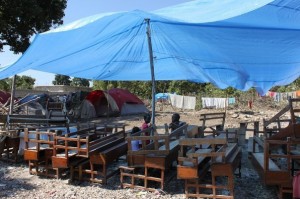
Pretty Little Girl Near Blue Tarp all photos by Ed
Six weeks after the horrific earthquake that has shaken Haiti to its knees, our friend Missionary Ed writes:
12:17 AM Just had a hefty, albeit short, tremor. Woke everybody downstairs up. I never knew this about earthquakes. I knew you could have a couple of aftershocks in the first day or so, but not the well over 100 aftershocks that we are still having 6 weeks later…
Those people in his community of Petit Goave whose houses were not reduced to rubble (there are only a few standing) have been sleeping and worshipping outdoors, for fear of being trapped in another quake.
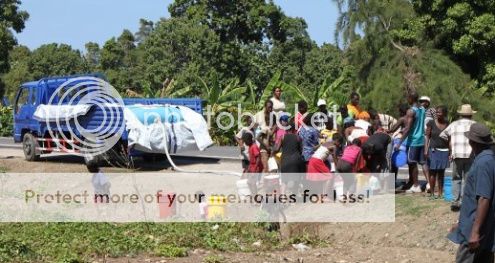
Clean Water for the Thirsty
Last week, Ed wrote:
Thursday 2/25 We all slept in the house last night. We all got up this morning. We have collected our tents and are trying to move on to Jan 13th. The loooooong day of Jan 12 appears to be coming to an end…
It is beyond my own imagining. In the meantime, he and his group are distributing thousands of pounds of rice and beans. Everyday these people eat rice and beans, and they give thanks for it.
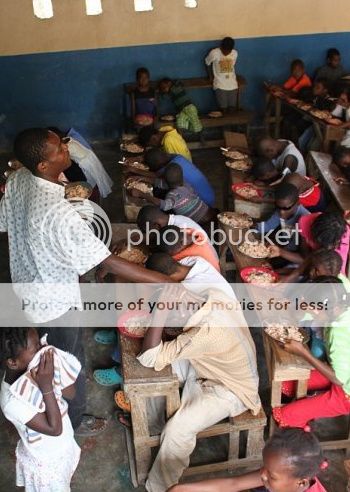
A Blessing Before the Meal
The distributions do not always go well. The people of Haiti are needful of many things, including prayers. If during this Lent you are looking to give alms – tomake a charitable donation- please don’t forget them!
In the barbaric cave for the dead
Known in Creole as simply ‘mog’
My trembling hand blesses them
May the angels lead you far, far from here
And do so in all haste
You and this throng of dead that surround you
—Father Rick Frechette, from Haiti: The God of Tough Places, The Lord of Burnt Men
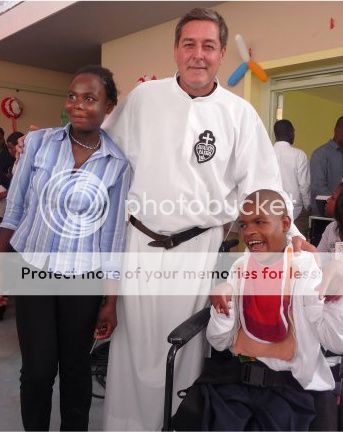
Fr. Frechette on a Better Day in Haiti, (Source)
Back on February I wrote a little about the Passionist priest, Fr. Rick Frechette, who has worked in Haiti for 22 years and has done marvelous work. Yesterday, Matt Labash wrote a great deal more, and it is very moving:
. . .every Thursday—since long before the earthquake—Frechette and a band of Haitian volunteers trek to the city morgue and claim the nameless dead, who lie naked in bloated heaps on a blood-streaked concrete floor. “You’ve heard of Tuesdays with Morrie,” Frechette smiles, “this is Thursdays with the Krokmo” (a Creole pejorative term for undertaker. It translates as the “death hook,” meaning the show is over). The place is jammed and the dead often piled seven or eight high. The workers there are so inured to the stench and spectacle, that Frechette has seen a morgue attendant slaloming on roller blades around the bodies and workers eating their lunch while sitting on stacks of cadavers as though on breaktime in the office kitchenette.
In Haiti, even before the quake, dead bodies were nothing more than background music—as commonplace as they are unnoticed. If they didn’t end up in the stark death-cave that is the general hospital morgue, they were burned in the streets on the spot where they died (a pragmatic hygiene concern). The decency and sentimentality that a better-developed society affords are luxuries here. Father Rick and his men gather the bodies themselves, packing them into makeshift coffins fashioned from supermarket cardboard boxes. They then truck them outside the city, up a sun-bleached highway that runs alongside the Caribbean Sea, to the rolling wastelands of Titanyen, which translates from Creole as the “fields of less than nothing.” A New Orleans-style Haitian jazz-funeral band—all horns and drums—plays graveside. Father Rick, an irreverent sort, calls them “The Grateful Dead.” Then he and his men plant the cardboard coffins in large holes dug by their own gravediggers, endowing their cargo in death with a tiny modicum of the dignity that eluded them in life
…
Everywhere you turn, it seems, there’s a new horror: the toddler found alive holding the hand of his mother, who lay dead beneath the rubble he was sitting on. The amputee mother I meet in the mini-tent city on the hospital grounds, whose young daughter cleans her wounds as though she is the mother now. The mother smiles and kisses me like I’m an old friend, though she doesn’t have much to smile about. In addition to losing her arm, two of her children were killed.On the roof of the guesthouse at night, under a starry panorama, the doctors and nurses and humanitarian soldiers of fortune who populate such scenes (aid-organization do-gooders who’ve had their tickets punched in all the dung-heaps of the world) find solace in their cups, trying to make sense of what they’re seeing. They get serious. What’s going to happen when the rainy season comes—and it’s coming soon. Water will swirl all around the tent cities, where people are defecating on the ground. Many of my battled-hardened drinking companions predict that without proper sanitation, immunizations, and shelter, the disease outbreaks could make the earthquake look like child’s play.
…
Haiti might be the only place where death with dignity entails being buried five-to-a-cardboard coffin. But it is moving and beautiful. Yet, I suggest to Frechette, it seems futile. Why do this? However horrible their lives were, this isn’t going to change that. Why spend so much time and energy serving people who’ll never know they’ve been served?Frechette thinks about it a long while, then says, “If the dead are garbage, then the living are walking garbage.”
Haiti’s latest horror is far from over. It may only be beginning. You really have to read the whole thing. It’s astonishing, harrowing, inspiring, and to say it puts things into perspective is putting it mildly.
It also puts a strong exclamation point to Pope Benedict’s words about the slavery of materialism -how we who live in more prosperous countries have a kinship with these poorest of the poor, who are slaves to poverty. The kinship is in the poverty. Theirs is material. Often, ours is spiritual.
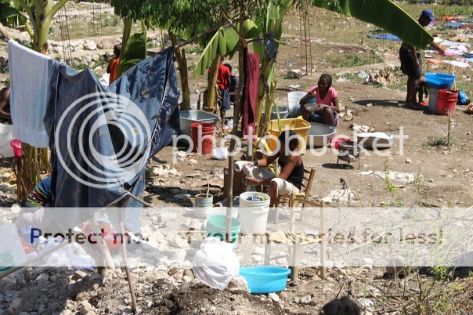
Doing Laundry, Salvaging Dignity
Bl. Teresa of Calcutta would often say that the meanest streets in the poorest cities did not compare with the spiritual poverty and emptiness of the prosperous West.
There is a slideshow here, meant to accompany Labash’s must-read article. (H/T)
Confounding and humbling. God help us all.



